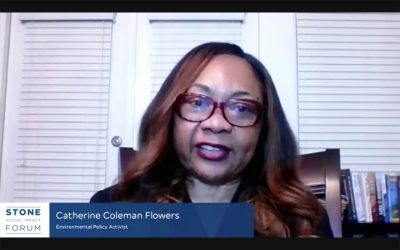With sea levels gradually rising and Arctic ice sheets melting, climate change is gaining particular urgency. But climate activists are urging for the crisis to be addressed with environmental justice in mind because of the continued harm they cause for lower-income communities.

The Edward M. Kennedy Institute for the U.S. Senate, a civic organization based in Boston dedicated to educating the public, held the second Stone Social Impact Forum Thursday. The Institute launched the series in 2019 to give a voice to leaders advocating for social change and equality.
MacArthur grant recipient Catherine Coleman Flowers, an environmental health advocate and founding director of the Center for Rural Enterprise and Environmental Justice, was featured at the event. She said climate change and environmental justice are closely related with government and civics.
“At this particular point, as we deal with climate change, we deal with environmental justice, all of these lessons are coming to bear for us to find the solution,” Flowers said. “We’re going to have to work together and work through government and work through these various institutions to dismantle what has created this crisis that we’re in.”
Growing up in Lowndes County, Alabama, Flowers said she had the opportunity to get involved as a young person with the Robert Kennedy Memorial Foundation as a youth fellow and visited Sen. Kennedy. She said this experience helped her witness the full role of the government.
“It helped me to understand the connection between what was happening in Lowndes County and what was happening in Congress and what was happening in the Senate,” Flowers said at the event, “and why it is important for us to understand civics and education.”
Flowers added the climate movement is an issue involving everyone, and capitalism often exacerbates environmental problems.
“I think that we can have a different type of economic system,” Flowers said at the event. “I’m hopeful that we can reform it to where it is not based on a small percentage of people making all the profits and everybody else is working and sacrificing their lives just to live every day.”
Jeff Goodell, an author and journalist who has covered climate change, said the issue has been around for a long time, but the concept of environmental justice — a social justice component to climate activism — has not.
“Ten years ago, when I was writing about climate change … there wasn’t really much of an environmental justice aspect of it,” he said. “This broader social justice aspect of the fight today is relatively new.”
Flowers said it took time for people to reckon with environmental justice as well as activism because people had to realize what systems they were supporting.
“We have to really look at what it means to be an environmental activist,” Flowers said. “Some people got engaged because they want to enjoy public lands, it wasn’t to make public lands available to everybody.”
Matthew Tate, a junior studying environmental analysis and policy and the vice president of Divest Boston University, said in an interview he views environmental justice as a way to assist communities most affected by climate problems — an unequivocal part of the movement.
“There needs to be more people for environmental justice activism because it’s so essential to have to protect the rights of minority and lower socioeconomic communities,” he said. “They’re very tightly knitted in the fabric of climate change and environmental justice.”
Tate said environmental justice activism should be a “central” focus for climate activists. He said large corporations’ exploitation of resources out of low socioeconomic communities is a rising issue.
“Environmental justice should be a priority,” he said. “I’ve seen a variety of cases where people part of the fossil fuel industry take advantage of lower socioeconomic communities because of that lack of representation.”
Tate said he thinks addressing climate change requires legislative action in addition to individual awareness and knowledge, which can also influence climate change. But, governmental action is crucial for creating change, he said.
“It’s a problem that won’t go away,” he said. “It requires governmental action too and encouraging laws and regulations.”
Tate said looking at affected communities is a crucial aspect as well — communities that are low income or predominantly minority can be disproportionately affected by climate crises, such as in Texas.
“You can’t have environmental activism without environmental justice activism,” he said. “All these ecosystems and networks are interconnected, the environment and nature with people.”























































































































